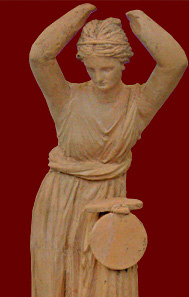
Statuette, 3-2 Century BCE

Amica is not the name of a real woman; it is the sole instance of Ausonius's use of the word to signify mistress. This playful epigram contrasts with an early elegy to his wife Sabina (see Epigrammata 20), where she is celebrated as both uxor and puella, a code word in Latin love poetry for the poet's girlfriend. In this short poem the poet yearns for a fantasy lover, who is presented in the first line. The amica is rowdy, provocative, and sensual; her delightful antics fill lines 1-6. The last three lines describe the alternative, the traditional uxor, and end in the spirit of Martial with a sting. The meter is unusual: dactylic trimeter hypercatalectic is composed of hexameter verses of 3 1/2 feet; the effect is a regular bouncing rhythm that is light and mocking. Ausonius employs this meter in only one other poem (Parentalia 28), in which he memorializes his cousin, Julia Idalia. Ausonius (c. 310-393 CE) was a grammaticus and professor of rhetoric in his native city, a tutor to Gratian (son of the Emperor Valentinian I) in Trier, and a statesman of high office and influence in the court in Rome. In addition, he was one of the last poets to compose in classical Latin; prolific, he was accomplished in a variety of literary forms (epigrams, epitaphs, epistles, verse catalogues, occasional poems, prayers). His work documents the Gallic people, particularly women who were otherwise unknown, and the mores of the middle class in his native Burdigala (Bordeaux, France), the capital of the Roman province of Aquitania and a prosperous commercial city in the 4th century CE.
nec studeat quasi casta loqui,
pulchra procax, petulante manu,
5 verbera quae ferat et regerat
Nam nisi moribus his fuerit,
Click on the underlined words for translation aids and commentary, which will appear in a small window.